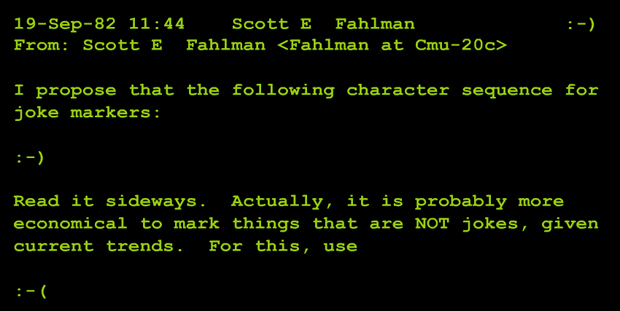
Jonathan Swift’s acerbic wit would pack a dangerous punch online. Just imagine the uproar if [SWIFT_EMAIL] posted“一个谦虚的建议”in an AOL chat room today. “A young healthy child well nursed is at a year old a most delicious, nourishing, and wholesome food, whether stewed, roasted, baked, or boiled,” the message would say; “and I make no doubt that it will equally serve in a fricassee or a ragout.”
Young mothers would besiege the discussion boards. Student activists would go on the warpath. Matt Drudge would have a field day. And chat administrators would curse satirists everywhere.
现在想象一下,乔纳森·斯威夫特(Jonathan Swift)是否将每一个辉煌的短语和刺眼的讽刺作品搭配在一起;- )看一下用来标记智能电子邮件备注的眨眼的表情,哦,现在我明白了。
卡内基·梅隆(Carnegie Mellon)教授斯科特·法赫曼(Scott Fahlman)说:“的确,乔纳森·斯威夫特(Jonathan Swift)和马克·吐温(Mark Twain)并不需要笑脸来有效地交流。”“但是,今天发送电子邮件和发布新闻组的大多数人不是乔纳森·斯威夫特(Jonathan Swift)或马克·吐温(Mark Twain)。他们无法很好地传达幽默。
“All you need is one or two clueless people who don’t get a joke to create an email response that dwarfs the original message. Certainly Twain had dissenters too, but his audience didn’t have a printing press at its disposal. Today, readers can retaliate.”
Why does Fahlman care so much about : -) and its literary reputation? Because Fahlman is the originator of the “emotional icon,” or “emoticon” — that international translator of irony and defuser of parody.
法赫曼说:““表情符号”是一个怪诞的标签。”“我更喜欢'笑脸。’”
Back in 1982, Fahlman was participating in a university bulletin board called “Opinion” when the smiley notion struck. In those early days of electronic communication, misunderstood sarcasm often sparked fierce disputes between students, and wisecracks too often prompted avalanches of response postings. Fahlman was annoyed, so he suggested using visual clues to communicate tone of voice.
While working on his PhD at MIT in the late 1970s, Fahlman contributed to bulletin boards where posters wrote “joke” after every wisecrack or jibe. He thought that he could do better. He tilted his head to the right and : -) was born.
十九年后,有2,000多个表情符号通过书籍渗透了流行文化(笑脸),浏览器(Emoticons),以及与25岁以下同事的几乎所有信件。甚至有一个致力于将社会平等和公民权利带给“左心情绪”的机构,例如( - :和< - ;
“直到……人们和表情符号变得更加宽容,分析师期望表情符号的暴力和隔离继续下去。”Emoticon News Bureau. What has the world come to?
它来了: - F(buck牙吸血鬼,缺少一颗牙齿)和%\ v(毕加索)。似乎法赫曼的笑脸建议催生了许多人使用的独特词典,但很少有人赞赏。
Fahlman has stared : -) in the eyes for nearly 20 years, and still hasn’t grown tired of peppering it throughout emails and devising new, more obscure variations on the original. At the end of every email he sends, Fahlman includes a “mood” rating that usually reads : -) (He only uses : – (when making customer-service complaints.)
他说:“每隔一段时间,我想看看我对文本图像的顶级有多高。”“我的最爱之一是亚伯拉罕·林肯(Abraham Lincoln)被一个已经有三个或四个块的python吃掉了。”
尽管如此,法赫曼还是对笑脸的日子的观念达成了目标。随着电子通信越来越复杂,用户将不再依靠破折号和括号来传达其观点。响起的笑脸是AOL和Microsoft Word,当用户键入老式表情符号时,它们会自动插入可爱的新图标。
“A lot of people ask me whether I expect these emoticons to be around in 50 years,” Fahlman says. “I’m amazed that they are around now. Smileys only make sense in an ASCII world. They resulted from ASCII’s limitations.”
Will the smiley burn out or simply fade away? The emoticon isn’t going to die without a fight, judging by the clamor and criticism that erupted whendespair.comsecured the trademark registration for : – (and announced that it would press charges against 7,000,000 email users found using “frowny” in correspondence. The trademark was real (the U.S. Patent Office officially granted Despair.com registration 2347676), but the lawsuit was a publicity stunt. Perhaps Despair.com should have included ; -) at end of its press release — hardly anyone got the joke, but a lot of people got defensive. Users ofSlashdotDeluged despair.com,愤怒的电子邮件消息有关知识 - 专业权利以及笑容和皱眉的神圣性。
People really do care. But does popularity make emoticons a viable and valuable linguistic phenomenon? Will smiley go down in history as the spokesman of the Internet revolution? Fahlman certainly hopes not. With a PhD in artificial intelligence from MIT and more than 30 years of academic research under his belt, the emoticon originator hopes to be remembered for more than his way with colons and dashes. Especially since he isn’t earning any royalties.
“I don’t want this emoticon to be the most important thing I do in my career,” Fahlman says. Like it or not, Fahlman’s invention continues to save modern-day Swifts and Twains from getting roasted, broiled, or just plain flamed for their biting sense of humor.
阅读侧边栏:擦掉你脸上的微笑
Create a new emoticon in Sound Off below!
Vote for your favorite user-nominated emoticon:
:-$— Put your money where your mouth is
(_8_(|)__— Homer Simpson
( - :— Jewish smile (read right to left)
[8^)— Dilbert
